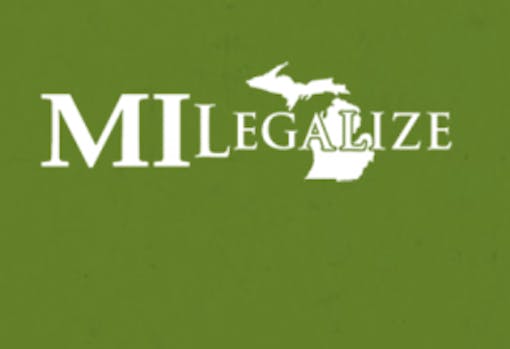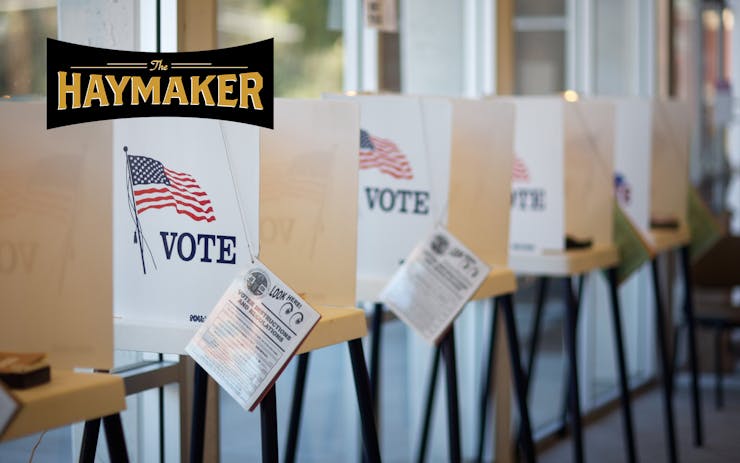‘The Haymaker’ is Leafly Deputy Editor Bruce Barcott’s column on cannabis politics and culture.
I was having lunch with legalization activists in Grand Rapids on 4/20 when Michael Tuffelmire introduced me to an odd theory that’s floating around Michigan’s state capital of Lansing.
Some GOP operatives are floating the idea of passing a watered-down version of legalization, via the state Legislature, to deflate voter excitement in November.
“We’ve got enough signatures” to put adult-use cannabis legalization on the state’s November 2018 ballot, Tuffelmire told me. Tuffelmire is a board member of MI Legalize, a local group working to end cannabis prohibition in the Wolverine State. The group expects the Michigan Board of State Canvassers to certify the measure’s ballot-readiness on Thursday. (Update: the Board certified the measure late Thursday morning.)
“But here’s the thing,” Tuffelmire went on. “Once it’s certified, it doesn’t go straight to the ballot. First it goes to the state Legislature. They have 40 days to pass the initiative themselves, or ignore it and let the voters decide. And there’s a thought that Republicans in the Legislature might try to pass it.”
Say what now?
“The people are in favor of legalization,” explained Tami VandenBerg, Tuffelmire’s fellow MI Legalize board member. VandenBerg, the owner of two popular Grand Rapids watering holes, sat across from me at HopCat, a brewpub next to the Van Andel Arena. “They voted overwhelmingly for decrim, for medical, and they’re polling heavily in favor of legalization. It’s the leaders that are not in favor of it.”
But they might be, if it will help their own re-election chances in November.
The 2% Solution
Republicans hold a 27-10 advantage in the Michigan Senate and a 63-46 majority in the House. Nine of 16 members of the state’s Congressional delegation are Republican. They’re trembling at the prospect of a blue wave in the coming midterm election.
Conventional wisdom holds that the more voters turn out at the polls, the better Democrats will do. If a popular legalization initiative shows up on the midterm ballot, that could be bad news for Michigan’s Republican electeds.

Dennis Darnoi, a Michigan political consultant, told WDIV’s Mara McDonald earlier this month that if the election were held right now, adult-use legalization “would pass with 55 or 56 percent of the vote.” Darnoi estimated that having the initiative on the ballot would boost voter turnout by 2 or 3 percent.
Even that slim a margin could be enough to tip the Michigan House over to the Democrats, Darnoi told WDIV.
“It is a legitimate concern, and if I were with the House Republicans, I would certainly take it seriously,” he said. “But I don’t think it’s reached critical mass at this point.”
Shop highly rated dispensaries near you
Showing you dispensaries nearMaybe not. But some are giving it a hard look. “I think everybody in this chamber has thought about that strategy,” state Sen. Mike Shirkey told the Detroit News last week.
Politicians Are Still Scared of Cannabis
Will it happen? I’m betting against it. For starters, it’s based on a flawed assumption. Legalization is no longer a clearly partisan issue. Polls and recent election results indicate that Republican voters are increasingly likely to favor regulated legalization. Republican politicians, meanwhile—like their Democratic counterparts (hello, Dianne Feinstein and Dick Durbin)—continue to cling to the disproven equation that legalization = soft on crime.
But the mere existence of the Turnout-Depression-by-Legalization theory stands as strong evidence that adult-use legalization is coming to Michigan one way or another. As VandenBerg said, this is a popular issue among voters. Politicians who stand in its way are likely to get steamrolled.
Is a Half Measure Better Than None?
The possibility of legislative adoption puts advocates like VandenBerg and Tuffelmire in a dilemma.
Michigan stands to become the Massachusetts of the Great Lakes region, a powerful foothold that will force change in surrounding states.
If state Republicans offer to adopt a feeble version of the ballot measure, would that earn the support of cannabis activists? The folks around the table at HopCat were divided. Some couldn’t stomach a half-measure version of legalization. Others were willing to take what they could get, reasoning that any legalization is better than no legalization. Police arrest more than 20,000 Michigan residents for cannabis-related offenses every year, and saving 20,000 lives from ruin every year is a pretty powerful argument.
I’m usually amenable to compromise, but in this case I’m with the all-or-nothing crowd. In 2018, legalization is strong enough to win outright. Voters are years ahead of politicians in their support for full adult use. Blue-leaning voters are plenty motivated already by Trump. They’re coming regardless of down-ballot issues.
When, Not If
If legalization happens—when it happens—Michigan stands to become the Massachusetts of the Great Lakes region, a powerful foothold that will force change in surrounding states. The coming of adult-use legalization in Massachusetts gave Vermont an extra nudge to legalize a couple months ago. Rhode Island may be next to go. New Jersey is on deck. It’s hard to imagine all those local customers and their tax revenue flowing across the state line. Just wait until retail stores in Massachusetts open and that imaginary scenario turns into a real revenue line in the state budget.
When Michigan goes, residents in neighboring Ohio, Indiana, Illinois, and Wisconsin will pop over the state line to pick up legal cannabis and give Lansing millions in extra tax revenue. (That will be legal. Bringing product back home across state lines won’t be.)
As we saw in Washington state, look for the outlets nearest Michigan’s southern border to be the state’s top-grossing stores for as long as the state’s neighbors prop up prohibition. The University of Notre Dame’s South Bend, Indiana, campus is less than six miles south of the Michigan state line. Border-adjacent burgs like Kinderhook, Lambertville, Ottawa Lake, Waldron, and Grand Beach are about to become popular tourist destinations.
Michigan: America’s 10th legal state. That’s got a nice ring to it—and it’s coming, no matter how the state Republicans deal with the initiative that’s about to arrive in Lansing.





